四年级上册英语北京课改版知识要点
最新北京版四年级上英语(全册)教材知识点整理.docx
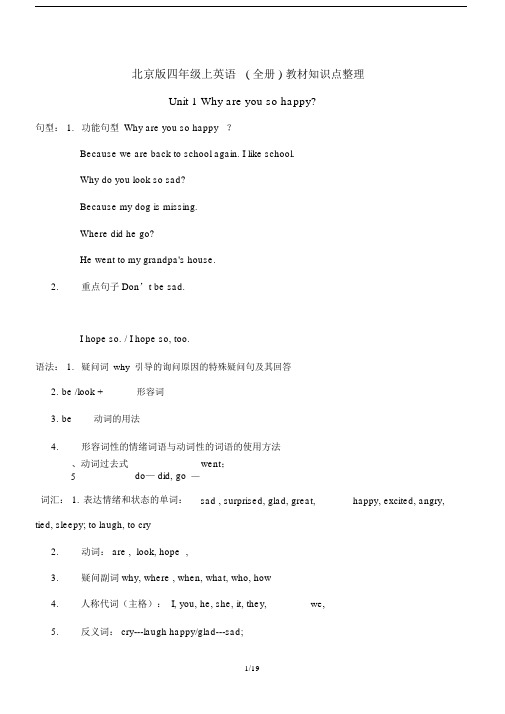
北京版四年级上英语( 全册 ) 教材知识点整理Unit 1 Why are you so happy?句型: 1.功能句型Why are you so happy?Because we are back to school again. I like school.Why do you look so sad?Because my dog is missing.Where did he go?He went to my grandpa's house.2.重点句子 Don’t be sad.I hope so. / I hope so, too.语法: 1.疑问词why引导的询问原因的特殊疑问句及其回答2. be /look +形容词3. be动词的用法4.形容词性的情绪词语与动词性的词语的使用方法、动词过去式do— did, go—went;5词汇: 1.表达情绪和状态的单词:sad , surprised, glad, great,happy, excited, angry, tied, sleepy; to laugh, to cry2.动词: are , look, hope ,3.疑问副词 why, where , when, what, who, how4.人称代词(主格): I, you, he, she, it, they,we,5.反义词: cry---laugh happy/glad---sad;6.其他: t oo, again7.重点:音:1. 元音: a, i, o, y2.元音字母合: ai , oo, ere,ea, ee, au,3.音字母合 gh, whUnit 2 May I speak to Mike?句型: 1.功能句型:May I speak to Yangyang?It's Maomao. Speaking.Is Guoguo there?Sorry, she is not home/here.Who's speaking? It's Lingling.2. 重要句型:Can I do ⋯? /I am sure⋯/ I have a bad cold. I can’t goto school.法: 1. speak to和..., 跟 ...;to后面要用人称代格形式.2. speaking是打用,打姓名可以This is ...(speaking)/It's... (here)..3. can, may, can't后面用原形.4.some 意思是一些 , 后面如果是可数名 , 要加 s.5.指示代 these 意思是些 , 如果后面是可数名 , 要用复数形式 .6. stay in bed待在床上.7. a lot of多,大量,后面加不可数名或可数名复数形式.8.介词 for 的用法 .词汇: 1.动词:may, speak, hear, call, drink;2.形容词: bad; 介词: there, later;3.人称代词: them;4.通讯工具:a telephone, a cell phone, a pay phone, a video phone,a cordless phone, a walkie- talkie;5.重点词组:call somebody, answer the phone, call back,speak to,would love to, have a look, have a bad cold,stay inbed,drink a lot of water,语音:字母组合: ay,ea,th,ere,er,ear,al or,的发音,元音字母: a, e, i, o的发音.Unit 3 Will you do me a favour?句型: 1.功能句型: 1Would you please hold the books for me?Certainly. Let me hold the books.2Would you mind opening the door for me, please?Sure, I ’d love to.3Will you do me a favor?What can I do for you?I forgot my ping-pong paddle at home.4Can I borrow yours?Sure. I will lend you mine.2.重要句型:1.It’s my pleasure.2.It’s so kind of you.3.Here are two. You can choose.语法1)Would you mind的用法:mind后面的动词要用带-ing的形式,即动名词. 2)名词性物主代词yours, mine在句子中起动名词的作用. 如 : Can I borrow yours? =Can I borrow your ping-pong paddle (yours=your paddle)I will lend you mine. (mine=my paddle)3)祈使句 let 的使用: Let me try.表示建议、请求、命令、警告等 .4)介词 of 和 for 的使用: It ’s so kind of you. What can I do for you?5)It ’s my pleasure (to help you).6)forgot 是 forget 的过去式 , 指的是“刚才忘记了 , 现在才想起来”.词汇动词: hold, find,let,borrow,lend,choose,mind名词 : ping-pong paddle, swimming glasses, lifebelt,mountain bike, door,pleasure形容词: full,kind其他: certainly,forgot,yours重点:open the door ,hold the door,close the door, lock the door, turn on the light,turn off the light,lift the heavy box, put the book back,hold books, close the window, pass me the water, open the door,turn off the radio, turn on the light, play word game, a glass of water, do sb. afavour音:元音字母和字母合在中的音:o, ar, oo, I, u, a, ou, aiUnit 4REVISION句型:他人情原因:Why are you so happy?Because we are back to school again. I like school.Why do you look so sad?Because my dog is missing.“某人在去到哪儿去了”:Where did he go?He went to my grandpa’s house.打找人:May I speak to⋯⋯?Is⋯⋯there?接(你是):Who’s speaking? It’s⋯⋯求他人帮助:Would you please hold the books for me?Certainly.Would you mind opening the door for me, please?Sure. I’d love to.借用物品:I forgot my ping-pong paddle at home.Can I borrow yours?Sure, I will lend you mine.法:1、祈使句否定式Don’t , don't 后面要求接原形 , 用以阻某人的行 , 作;2、形容在句子中做表, 要与系be 或 look用,构成句子的,形容不能直接放在主后面做;3、去式的用法; do—did, go—went;4、 speak to和..., 跟...;to后面要用人称代格形式.5 、speaking是打用,打用表示我是⋯ 可以This is ...(speaking)/It's... .6、情 can, may, can't后面跟原形.7、Would you please后面跟原形;8、Would you mind + 动词的 ing形式;9、borrow 、lend的用法:borrow是借入,lend是借出;10、名词性物主代词的用法. ( yours, mine )词汇:形容词 ( 情绪 ) :glad, sad, surprised, great,happy, excited, angry, tired, sleepy.动词:look, hope ,went ,speak, hear, drink,hold, call , find,let ,mind, forgot borrow,lend , choose,laugh, cry, lift, lock名词: door , pleasure人称代词(主格): we人称代词 ( 宾格 ) : them,me物主代词(名词性): yours,mine特殊疑问代词: why, where副词: again, too, there, later, certainly通讯工具: a telephone, a cell phone, a pay phone, a video phone,a cordless phone, a walkie- talkie动词词组: call somebody, answer the phone, open the door, hold the door open, close the door, lock the door, turn on the light, turn off the light,lift the heavy box, put the book back.语音: 1、元音字母 i和字母组合ea在单词中的发音.2、元音字母 e、a 在闭音节中读音 .3、元音字母 o 和字母组合 ar 在单词中的发音 .4、字母组合 ou, ow , air在单词中的读音如: about, round, housework, outnow, how, brown, flowergrow, know, snow, tomorrow , yellowpair, hair, chair, airplaneUnit 5 Which kind would you like?句型:功能句型: 1 Which kind would you like ?2 May I look at⋯, please?3 The red/⋯color will look nice on sb.重点句型: What colours do you have?/We have black, blue, green and brown.;How much are they?/ Eighty yuan.;May I try that on?/Sure. Here it is.:名 : pen, kind,shop, pair疑 : which,how much,what color: buy, sell , look, get, take,⋯颜色词 :blue, green,red, blue, white⋯重点: try on,go with,get cold,法:1)一般在的化, 如 look — looks和sell—sells;2)情 can, may 的用法3)介: at, of, on的用法4)数量 a 和 an 的用法;音 : 字母合 ir和er的音,如skirt, sneaker.Unit 6 May I take your order?句型 :功能句型:What would you like to eat?/ I’d like⋯May I take your order now?/ I’d like⋯It ’s twenty - one yuan./ It’s thirty yuan./ Here is your change.重点句型 :Can I have sweet and sour fish?What would you like for dessert?I will have two fried chicken wings, a hamburger and a Coke.:名 : dish,order, spoon, change食物: bean,ice cream,chicken wing: eat change形容 : salty,sweet,sour,fried重点: take order, apple pie, fried chicken wings, Peking Duck, soy milk, orange juice fish salad, mushroom soup法:There are ⋯would like⋯Please don ’t ⋯May I ⋯Can I ⋯will ⋯等的用 .音 : 字母 i 和 a 在中的法 , 如 kite和cat.Unit 7 What is nature?句型:功能句型:1)What falls down from the sky in winter? It’s snow2)What do you do on weekends? I often go out with my parents3)We cannot live without water/air.重点句型:2)Where do you go?3)When does it rain?4)What is nature? Everything is nature.5) You try to be close to nature.:宇宙: the Earth, the Sun, Mars, star, moon季: summer, spring, winter, fall天气: hot, warm, cool, cold, wet, windy, cloudy⋯自然象(名) : snow, rain, water, air, tree, ice, Snowflakes,重点:fall down, climb hills,go skiing,close to ,the Earth, the Sun,on weekends, go out with sb, try to,on a farm, in the forest,on the grassland, by the lake, in the mountains,go to parks, take long walks, close to nature, visit my uncle, find out on the internet法:1)助: do,does 的使用;2)特殊疑的使用: what, where, when,3)一般在:三与的关系4)介: from, in, on, with,to ,6)live —love,try to—try on的比音:字母合al,ow,ou,th在些 f al l, snow-d own, out-with out; ear th , with , wi th out,中的音字母 i, e, o, a音.Unit 8 REVISION功能句型:询问他人意愿:Which kind would you like?This kind looks nice.征求别人意见May I look at that pair of shoes? Here you are.某颜色适合顾客The red color will look nice on you.点餐的用语:What would you like to eat? I’d like some vegetables.May I take your order? Yes, I’d like a salad, fish , and green beans.结帐的用语It ’s twenty -one yuan.Here you areHere is your change.自然现象:在冬季天上会掉落什么:What falls down from the sky in winter? It’s snow在周末我们会做些什么描述某人离了什么就不能做什么事:We cannot live without water/air.重点句型:(1)价How much are they?They are ... yuan(2)某人去哪?Where do you go ? I go to⋯法:(1)情的用法 .(2)量的用法 .A loaf of a glass of a bowl of a pair of (3)疑 Which 、How much 的用法 .(4) Would like的用法.(5)介的用法 .In , from , with(6)第三人称与的化 .(7)助的用法 .(8)三与的关系 ,(9) can/cannot+ 原形等:文具: a pen a brush疑 : which how much色: blue green服装: an overcoat a hoodie a jean skirt a school uniform 鞋:slippers boots sneakers sandals餐具: a plate a spoon knife fork an opener食物: chicken wing bread pork ribs meatballs French fries a hamburger饮料: soup water coke名词: snow rain ice snowflakes the Earth the Sun Mars parents 词组:different kinds all kinds of try on school uniforma pair of a bowl of a loaf of a glass ofchicken nuggets French fries pork ribs fried chicken wingsfall down on weekends close to climb hills go skiing语音:1、元音字母 i在开音节单词中的发音.2、元音字母 a 在闭音节中读音 .3、元音字母 o 和字母组合 al 在单词中的发音 .4、字母组合 ir er oo ea在单词中的读音如: spoon boot hoodiebean eat cream全册知识点梳理和分析( 一) 本册主题和相关知识点1、本册将学习1)他人情原因;Why are you look⋯?(Unit One)2)“打”; May I speak to⋯⋯?(Unit Two)3)求帮助; Would you please(mind)⋯⋯for me?(Unit Three)4)商店物: Which kind would you like?(Unit Five)5)餐点餐; What would you like to eat?(Unit Six)6)自然象; What falls down from the sky in winter?等六大 .2、法:第一元1.Be 的用法2.助 do 的用法3.去式 go-went do- did4.与形容的区分5to+ 原形6. Don’t be ⋯I ’m sure ⋯7.一般将来 He will第二元1.May I speak + to2.用表示我是⋯ . It ’s⋯3.祈使句: Please do ⋯第三元1.Would you please +原形Would you mind +ing2.borrow/lend的用法:3.物主代词的用法:your —yours my —mine his—hisher —hers its—its our—ours their—theirs第五单元1.动词三单This kind look s nice. This shop sell s jackets.2. will +动词原形3.Kind/kinds的区别4.情态动词 Would的用法5. different kinds中different---same的区别及用法.6.May, can, should等词的区别与用法.7.how much are they? How much—how many的区别和用法.8. a pair of shoes中a pair of的用法第六单元1.可数名词与不可数名词2.What would you like to+动词原词What would you like for+名词3.food —fruit—drinking---dessert等食物的分类第七单元1.介词in +季节;on +星期2.专有名词: the Earth the Sun Mars4.What falls down from the sky in winter?中down , from, in的理解和用法. 5.一般现在时的用法1) What do you do on weekends?一般在句构和用.2)I often⋯一般在答句的构和用.3) Sara often ⋯一般在第三人称述句的构和用.6.掌握介 without的用法.7. Everything is nature.中Everything在句中做主be或的构及用 .3、:情: glad, sad, surprised, great,happy, excited, angry, tired, sleepy.味道: salty, sweet, sour.:look, hope,went, speak,hear, drink,hold, call , find, let,climb, tell, live,laugh, cry, lift, lock名: door , pleasure,pen, kind, pair, shop, dish, order, parent, bean, spoon, wing, change, ice, nature.人称代(主格): we人称代 ( 格 ) : them,me物主代(名性): yours,mine副: again, too, there, later, certainly, sure, down, out.特殊疑代: why, where, where.副: again, too, there, later, certainly色:blue, green.介: with, without.通工具: a telephone, a cell phone, a pay phone, a video phone,a cordless phone, a walkie- talkie: call somebody, answer the phone, open the door, hold the door open,close the door, lock the door, turn on the light, turn off the light,lift the heavy box, put the book back,close to, climb hills, go skiing.4、音:重点了解1)、元音字母 i和字母合ea在中的音.2)、元音字母 e、 a 在音中音 .3)、元音字母 o 和字母合 ar 在中的音 .4)、字母合 ou, ow , air在中的音5)、字母合 ir, er,al在中的音.( 二) 述各个教学重点1 )情感重点是他人情的原因Why are so happy?和Why do you look sad?用happy, sad, excited等表达情的形容一自己的心情;某人在去的去哪了Why did you go?去式的用法:do—did, go—went;2)打重点是在情景中打找人:Hello! May I speak to⋯⋯?Is⋯⋯there?接方是: Who’s speaking?It ’s⋯⋯3 )求的重点是向他人求助的句式:Would you please hold the books for me?和Would you mind opening the door for me ?以及Would you please /would you mind的使用;在情景中借用物品“ Can I borrow yours?.4)物的重点是方意愿的句式Which kind would you like?;某种商品的价格的句式: How much are they? ;表达某种商品的看法或建的句式:The red color will look nice on you.5)点餐的重点是他人想吃什么的句式:What would you like to eat?;表达我想吃⋯的句式: I ’d like ⋯. 在餐中征求点餐的句式: May I take your order now?以及在餐里、找零: It ’s ⋯⋯ yuan. Here is⋯.yuan. Here is your change;6)大自然的重点是在冬季天上会掉落什么:What falls down from the sky in winter?在周末我会做些什么以及做些事的目的是近自然的句型答What do you do on weekends?以及描述某人离了什么就不能做什么事的句式:We cannot live without water/air.。
北京版四年级上册英语单元重要知识点总结
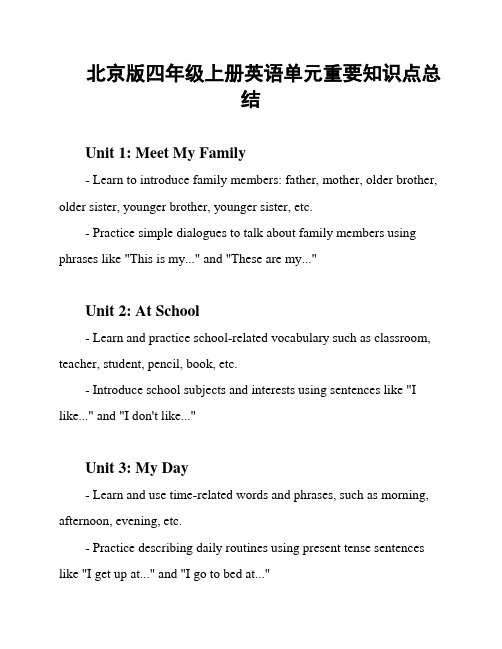
北京版四年级上册英语单元重要知识点总结Unit 1: Meet My Family- Learn to introduce family members: father, mother, older brother, older sister, younger brother, younger sister, etc.- Practice simple dialogues to talk about family members using phrases like "This is my..." and "These are my..."Unit 2: At School- Learn and practice school-related vocabulary such as classroom, teacher, student, pencil, book, etc.- Introduce school subjects and interests using sentences like "I like..." and "I don't like..."Unit 3: My Day- Learn and use time-related words and phrases, such as morning, afternoon, evening, etc.- Practice describing daily routines using present tense sentences like "I get up at..." and "I go to bed at..."- Understand and use words related to the activities performed during different times of the day.Unit 4: My Toys- Learn and identify different toy names with words like doll, ball, robot, car, etc.- Describe toys using adjectives and simple sentences like "It'sbig/small/light/heavy/fun."Unit 5: My Body- Learn and recognize body parts vocabulary like head, shoulders, knees, toes, etc.- Practice asking and answering questions related to body parts using sentences like "What's this?" and "These are my..."Unit 6: At the Park- Learn and understand words and phrases related to park activities, such as swing, slide, seesaw, etc.- Describe park activities and express preferences using phrases like "I like to..." and "I don't like to..."Unit 7: In the Kitchen- Learn and practice kitchen-related vocabulary, including words like table, chair, fridge, stove, etc.- Understand and use simple imperative sentences like "Sit down" and "Stand up" in a kitchen context.Unit 8: At the Zoo- Learn and recognize animal names, such as lion, elephant, giraffe, monkey, etc.- Practice asking and answering questions about animals using sentences like "What's this?" and "Is it a...?"- Understand and use adjectives to describe animals.以上就是北京版四年级上册英语单元的重要知识点总结。
四年级上北京版英语U5-U7知识点总结1

一、单词、短语1.颜色(colour):red红色blue蓝色yellow黄green绿色brown棕色black黑色white白色pink粉色purple紫色orange 橙色gray灰色2.鞋(shoes):sneakers运动鞋sandals凉鞋boots靴子slippers拖鞋3.服饰(clothes):jacket夹克衫trousers/ pants裤子shorts短裤coat外套overcoat大衣shirt衬衫T-shirt T恤skirt短裙dress连衣裙gloves手套uniform制服socks袜子cap帽子hat礼帽4.食物(food):meatball肉丸Peking Duck烤鸭chicken鸡肉fish鱼肉salad沙拉soup汤hamburger汉堡sandwich三明治chips薯条ice cream冰激凌pie 派pizza披萨cake蛋糕potato土豆cabbage卷心菜mushroom蘑菇5.饮品(drinks):water水milk牛奶tea茶soy milk豆浆juice 果汁6.数字(number):onetwothreefour fivesixseveneightnineteneleventwelvethirteenfourteenfifteensixteenseventeeneighteennineteentwenty20thirty30forty40fifty50sixty60seventy70eighty80ninety90one hundred100 7.自然(nature): snow雪,下雪rain雨,下雨wind风ice冰air空气8.天气(weather)snowy下雪的rainy多雨的windy刮风的cloudy多云的sunny阳光充足的fine晴朗的hot热的cold 冷的warm温暖的cool凉爽的9.地点(place)park school farm zoo forest lake grassland mountain10.季节(season)spring春天summer夏天autumn/fall秋天winter冬天动词短语:want to想要look nice看起来好look at看try .on试穿get cold 变冷take your order点餐become water变成水go to parks去公园take long walks去散步close to nature 亲近自然visit my uncle看望我的叔叔find out找到其他短语、短句:Excuse me打扰下here you are给您how much多少钱 a pair of一双how about怎么样Of course 当然for me 给我in summer在夏天In Sydney在悉尼on weekends在周末on a farm在农场in the forest在森林on the grassland在草原by the lake 在湖边in the mountains在山上on the internet 在网上二、句子:购物 1.Can I help you?/What can I do for you? 我能帮你吗?Yes. I want to get a pen. 是的。
四年级上 知识梳理
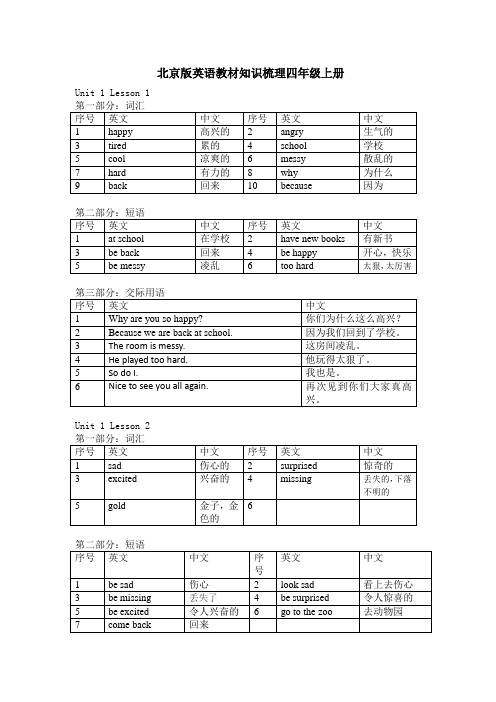
hold on
等一下
2
第三部分:交际用语
序号
英文
中文
1
May I speak to Mike?
我可以找一下Mike说话吗?
2
This is Yangyang speaking.
我是Yangyang。
3
Please hold on.
请稍等。
4
Sam, it’s for you.
Sam是找你的。
5
I’m doing housework with my mum.
69元。
3. Here is the money.
给你钱。
4.Here is your change.
找给你的零钱
Unit7 Lesson23
第一部分:词汇
nature
自然
snow
雪
weather
天气
below
下面
ice
冰
北京版英语教材知识梳理四年级上册
Unit 1 Lesson 1
第一部分:词汇
序号
英文
中文
序号
英文
中文
1
happy
高兴的
2
angry
生气的
3
tired
累的
4
school
学校
5
cool
凉爽的
6
messy
散乱的
7
hard
有力的
8
why
为什么
9
back
回来
10
because
因为
第二部分:短语
序号
英文
中文
序号
尺子
第二部分:短语
北京课改版四年级上单词总结

四年级第一学期单词1.again又,再一次: Nice to see you again.很高兴再次见到你。
2.we我们: we are going to plant trees.我们将去种树。
3.are是: we are back to school again.我们又回到学校。
4.glad高兴的: Glad to see you too.见到你也很高兴。
5.why为什么: Why are you so happy?你为什么这么高兴呢?6.look看起来: .It looks so cool.它看起来很酷。
7.sad伤心的: Why do you look so sad?为什么你看起来那么伤心?8.bad严重的: I have a bad cold.我得了重感冒。
9.which哪个: Which season do you like?你喜欢哪一个季节?10.where在哪里: Where are you from?你从哪里来?11.there在那里——There are four. 有四个有12.hope希望: I hope so,too.我也希望这样。
13.hold拿着——cold寒冷的14.great极好的,伟大的15.surprises吃惊的:I’m very happy and surprises我既高兴又吃惊。
16.went去:He went to my grandpa’s house.他去过我爷爷家。
17.lend借给:I will lend you mine.我将把我的借给你。
18.may可以——May五月19.speak说话:May I speak to him?我可以和他说话吗?20.call打电话: I want to call my mom.我想要给我妈妈打电话。
21.door门: open the door打开门ter稍后: Can you call back later?你可以稍后再打来电话吗?23.them他们: She will like them very much.她将非常喜欢它们。
北京版四年级上册知识梳理(完整资料).doc

此文档下载后即可编辑北京版小学英语四上知识梳理Unit 1 Why are you so happy?feeling(情绪):sad悲伤的, surprised感到惊讶的, angry生气的, tired劳累的, excited 兴奋的, upset苦恼的, worried担心的,glad高兴的, happy,again又,再次, why为什么, book书, look for 寻找, get well 康复, messy脏乱的,missing丢失,hope希望,square正方形,worry担心back at school回校, played too hard玩得太累, come back回来, go to the zoo去动物园, eat up fish吃光鱼, read books读书, get well康复1. Why are you (so) happy? 你为什么(这么)高兴?Because we are back at school. 因为我们都回到了学校。
2. Why do you look so sad? 为什么你看起来这么伤心?Because my dog is missing. 因为我的狗丢了。
3. Nice to see you all again.很高兴再次见到你。
4. So do I.我也是。
5. D on’t be sad/upset. 别伤心/心烦。
6. I hope so. 我希望如此。
7. It’s square in shape and blue in colour. 它是方形,蓝色的。
8. Let’s look for it together. 我们一起寻找吧。
9. Don’t worry. 别担心。
10. She will get well soon. 她将很快康复的。
注意:句子的表达及人称和动词搭配I am, you/we/they are, he/she/ it is.I/you/we do, he/she/it doesUnit 2 May I speak to Mike?话题:打电话speak说话, robot机器人, housework家务劳动, Ms女士, Mrs太太, there在那里, really真的, bring带来, school学校, bad严重的, cold感冒, drink喝have a look看一看, do housework做家务, hold on稍等, call back回电话, bad cold重感冒, go to school去上学, stay in bed卧床休息, drink a lot of water大量喝水, play football踢足球, come to my birthday party参加我的生日聚会,bring… to school带到学校来,call back回电话,1. May I speak to Mike? This is Yangyang. 我能找一下麦克吗?我是洋洋。
京版小学英语四上知识总结
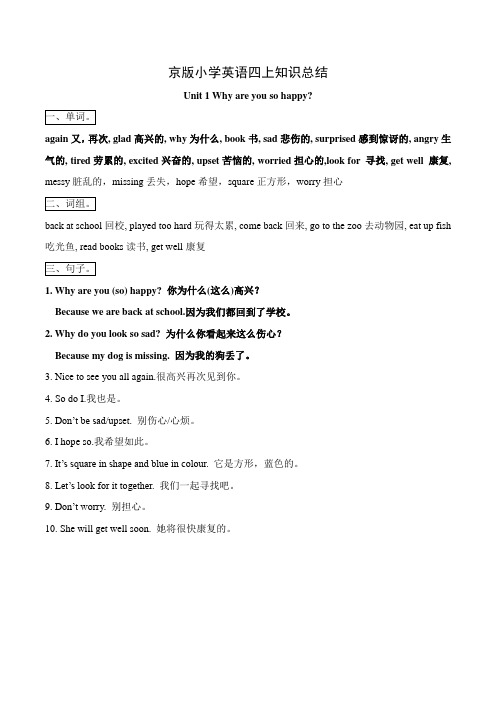
京版小学英语四上知识总结Unit 1 Why are you so happy?again又,再次, glad高兴的, why为什么, book书, sad悲伤的, surprised感到惊讶的, angry生气的, tired劳累的, excited兴奋的, upset苦恼的, worried担心的,look for 寻找, get well 康复, messy脏乱的,missing丢失,hope希望,square正方形,worry担心back at school回校, played too hard玩得太累, come back回来, go to the zoo去动物园, eat up fish 吃光鱼, read books读书, get well康复1. Why are you (so) happy? 你为什么(这么)高兴?Because we are back at school.因为我们都回到了学校。
2. Why do you look so sad? 为什么你看起来这么伤心?Because my dog is missing. 因为我的狗丢了。
3. Nice to see you all again.很高兴再次见到你。
4. So do I.我也是。
5. D on’t be sad/upset. 别伤心/心烦。
6. I hope so.我希望如此。
7. It’s square in shape and blue in colour. 它是方形,蓝色的。
8. Let’s look for it together. 我们一起寻找吧。
9. Don’t worry. 别担心。
10. She will get well soon. 她将很快康复的。
Unit 2May I speak to Mike?speak说话, robot机器人, housework家务劳动, Ms女士, Mrs太太, there在那里, really真的, bring带来, school学校, bad严重的, cold感冒, drink喝have a look看一看, do housework做家务, hold on稍等, call back回电话, bad cold重感冒, go to school去上学, stay in bed卧床休息, drink a lot of water大量喝水, play football踢足球, come to my birthday party参加我的生日聚会1. May I speak to Mike? This is Yangyang. 我能找一下麦克吗?我是洋洋。
2021年北京版四年级上英语全册教材知识点整理

北京版四年级上全册教材知识点整顿Unit 1 Why are you so happy?句型:1. 功能句型Why are you so happy?Because we are back to school again. I like school.Why do you look so sad?Because my dog is missing.Where did he go?He went to my grandpa's house.2. 重点句子Don’t be sad.I'm sure he will come back soon.I hope so. / I hope so,too.语法:1. 疑问词why引导询问因素特殊疑问句及其回答2. be /look + 形容词3. be动词用法4. 形容词性情绪词语与动词性词语用法5、动词过去式do—did,go—went;词汇:1. 表达情绪和状态单词:sad ,surprised,glad,great,happy,excited,angry,tied,sleepy;to laugh,to cry2. 动词:are,look,hope,3. 疑问副词why,where,when,what,who,how4. 人称代词(主格):I,you,he,she,it,they,we,5. 反义词:cry---laugh happy/glad---sad;6. 其她单词:t oo,again7. 重点词组:back at school,played too hard,come back,go to the zoo eat up fish,readbooks,get well语音:1. 元音:a,i,o,y2. 元音字母组合:ai ,oo,ere,ea,ee,au,3. 辅音字母组合gh,whUnit 2 May I speak to Mike?句型: 1. 功能句型: May I speak to Yangyang?It's Maomao. Speaking.Is Guoguo there?Sorry,she is not home/here.Who's speaking?It's Lingling.2.重要句型:Can I do…?/I am sure… / I have a bad cold. I can’t go to school.语法: 1. speak to 和...说话,跟...说话; to 背面要用人称代词宾格形式。
四年级上册英语单元知识梳理 北京课改版.doc

四年级上Unitl单元重点1.happy幸福的,高兴的6. excited兴奋的,激动的2angry生气的,愤怒的7. upset心烦的,苦恼的3sad悲伤的:难过的8. worried担心的4 surprised感到惊讶的5. tired疲倦的重点句型1.Why are you so happy ?你们为什么这么高兴?Because we are back at school.因为我们又回到了学校Why are you so angry ?你们为什么这么愤怒?Because the room is messy .因为房间太乱Why is he so tired ?他为什么这么疲倦?Because he played too hard .因为他玩得太多2Why do you look so sad ?你为什么这么难过?Because my dog is missing 因为狗丢了.Why do you look so surprised ?你们为什么这么惊讶?Because the gold is missing 因为金子丢了Why do they look so excited ?他们为什么这么激动?Because they will 1 go to the z 00?因为要去动物园。
3Why are you upset ?你为什么这么心烦?Because my new watch is missing 因为手表丢了四年级上Unit2单元重点重点单词或短语1. one 6.s ix 六2.two 二7. seven 七3.three 三 8. eight 八4.four 四9 . nine5.fve 五10 . .ten 十重点句型1.May I speak to Mike ?我找Mike.(我可以和Mike 说话吗?) This is Yangyang .我是洋洋If s Yangyang我是洋洋。
北京课改版英语小学四年级上总复习

13.Please hold on,... ,it’s for you.
请稍等,...... ,是找你的。
9.get well
康复
go with...
与......搭配
10.do housework
做家务
take your order
点菜
11.have a look
看一看
in summer
在夏天的时候
12.hold on
稍等
close to nature
接近大自然
13.tell...to...
告诉...
shorts
短裤
6.excited
激动的
uniform
制服
7.miss
缺失的
Chinese cabbage
卷心菜
8.hope
希望
salty
盐多的
9.worried
担心的
soy milk
豆浆
10.watch
手表
mushroom
蘑菇
11.together
一起
pizza
披萨
12.ill
生病的
sandwich
机灵点,聪明的
23.easy
容易的
ice
冰
24.door
门
walk
散步
25.kind
体贴的,善良的
interesting
有趣的,有意思的
26.window
窗户
close
接近的
27.glass
玻璃杯
farmer
农夫,农民
28.borrow
借入
lake
湖Байду номын сангаас
北京版英语教材四年级上知识梳理
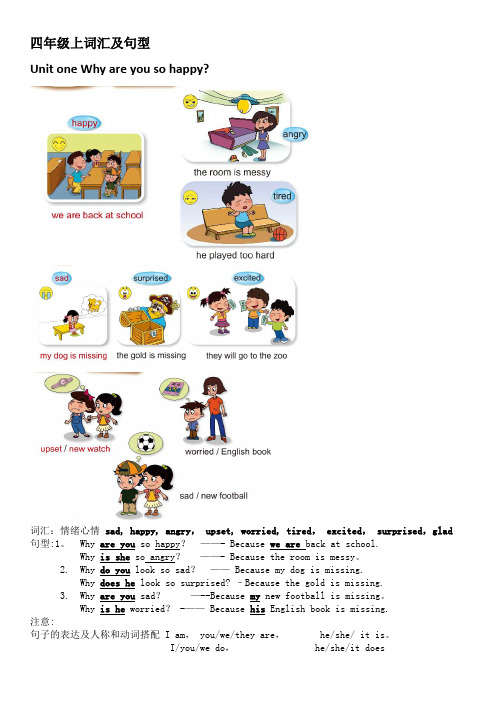
四年级上词汇及句型Unit one Why are you so happy?词汇:情绪心情 sad, happy, angry, upset, worried, tired, excited, surprised,glad 句型:1。
Why are you so happy?——- Because we are back at school.Why is she so angry?——- Because the room is messy。
2. Why do you look so sad?—— Because my dog is missing.Why does he look so surprised? –Because the gold is missing.3. Why are you sad?—--Because my new football is missing。
Why is he worried? -—— Because his English book is missing.注意:句子的表达及人称和动词搭配 I am, you/we/they are, he/she/ it is。
Unit two May I speak to Mike?话题:打电话短语表达: call打电话, call back回电话,speak, bring… to school带来telephone(cell phone手机,telegraph电报),My number is… bad cold重感冒 Stay in bed, drink a lot of waterWhat can I do for you?我能做些什么He is doing housework with his mother。
做家务I have…我有… I have some books。
He has a new robot.句型结构: 1. May I speak to Mike? This is Lingling.Speaking。
北京版小学英语教材四年级上册知识点总结

北京版小学英语教材四年级上册知识点总结(必做:所有内容一个单词中英文两遍,写在大英语本上;)(选做:四会单词默写,看中文写英文;三会单词及重点短语的英译中)四会单词:L1: again why books coolL2: sad great goldL3: new watch like together shapeL5: Ms Mrs speakL6: there story bring schoolL7:can bad tomorrow bed drink waterL9: much easyL10: door kind window cold turn openL11: ping-pong bat borrow take fine marker ruler pencil caseL15: get pen kind black brown think shapeL16: shoes try thirtyL17: buy trousers yellowL19: eat healthy potato now cook sweetL20: soup appleL21: twenty chicken change thirty today sixty-nineL23: snow hot rain clever water bad hard weatherL24: interesting close farmer lakeL25: live say kite wind三会单词:L1:glad because them happy angry tiredL2: missing surprisedL3: upset worried ill worryL5: robotL6: tell her really welcomeL9: please on play showL10: mindL11: favour scissors crayon sharpenerL15: help different colourL16: comfortable certainly takeL17: sell green redL19: sour saltyL20: salad fish hamburger chips dessertL21: moneyL23: because become degreeL24: sounds weekends liveL25: air trees without things plants grow重点短语:L1: be back at school the room is messy he played too hardL2: do n’t be sad come back go to the zooL3: don’t be upset blue in colour English book new footballL5: speak to doing housework hold on have a lookL6: call back the Monkey King the Harry Potter stories(首大名称)L7:bad cold go to schoolL9: hold these books no problem on the computer close the window turn off the light pass me the waterL10: a glass of hot water opening the door turning off the radio turning on the lightL11: Will you do me a favour? I don’t have my ping-pong bat with me. of courseL15: a nice colourL16: look at try on how much that pair of shoes that pair of slippers these sandals these boots those sneakersL17: a new jacket red one blue T-shirt black overcoat yellow cap school uniformL19: the sweet and sour fish take your order Chinese cabbage and potatoes some vegetables some meatballs Peking Duck a glass of soy milkL20: mushroom soup have ice cream(have some…/ an…) a pizza a glass of juice a sandwichL21: orange juiceL23: in summer in winter below zero in Sydney(首大名称)it’s raining it’s snowing the sun is shiningL24: go to park close to nature love nature visit my uncle this winter vacation on a farm in the forest on the grassland by the lakeL25: find out on the Internet (首大名称)。
北京版四年级上册英语单元重点回顾

北京版四年级上册英语单元重点回顾
第一单元:认识新同学
- 研究了问候语和介绍自己的常用句子
- 研究了数字1-10的读音和写法
- 研究了熟悉的学科和时间的表达方式
第二单元:我的家庭
- 研究了家庭成员的称呼和介绍家庭成员
- 研究了表示衣物的名词和颜色以及简单的句子结构
- 研究了询问和回答关于家庭成员职业的问题
第三单元:我的学校
- 研究了学校内常见地点的名称以及表示位置方位的词汇- 研究了询问和回答关于学校事务的问题
- 研究了表达喜欢和不喜欢的句型和常用动词
第四单元:我喜欢的食物
- 研究了常见食物的名称和颜色
- 研究了表示喜欢和不喜欢的形容词以及相关句型
- 研究了表达食物数量的数量词
第五单元:城市与乡村
- 研究了城市和乡村的常见建筑物和交通工具的名称
- 研究了表达位置关系和方位的介词
- 研究了询问和回答关于所在地点和如何去某地的问题
第六单元:动物世界
- 研究了常见动物的名称和特征
- 研究了询问和回答关于动物性和所属类别的问题
- 研究了表达动物数量的计量词
第七单元:圣诞节快乐
- 研究了关于圣诞节的常见词汇和俗
- 研究了表达圣诞祝福的句子和常用动词短语
- 研究了关于圣诞礼物的表达方式
以上是北京版四年级上册英语单元的重点回顾。
希望同学们能够通过复习,巩固所学的知识,并取得更好的学习成绩!。
北京版英语四年级重点

单词:again又,再次book 书glad高兴的,快活的why为什么sad悲伤的;难过的upset心烦的,苦恼的happy 高兴的surprised 感到惊讶的tired 疲倦的angry 生气的excited 兴奋的cool酷的worried 担心的messy 凌乱的soon 很快missing 丢失的great 极好的new 新的gold 黄金watch 手表together 一起like 像···样because 因为square 正方形(的)shape 形状ill生病的短语:look for 寻找worry担心be back at school 返校get well康复look so sad 看上去这么伤心play too hard 玩的时间太长come back 回来go to the zoo 去动物园buy her a pet dog 给她买只宠物狗eat up 吃光be upset 苦恼square in shape 形状是正方形的blue in colour 颜色是蓝色的English book 英语书new football 新足球each other互相,彼此单词:speak说话robot机器人housework家务劳动Ms女士Mrs 太太;夫人there在那里her她(宾格)call(给··)打电话tell告诉;建议really真的,是吗(表示疑问、惊讶、恼怒等)bring带来bad严重的,厉害的cold感冒school学校tomorrow明天drink 喝短语:speak to 跟...通话have a look 看一看do housework 做家务hold on 稍等call back 回电话bring. to school 带...来学校have a bad cold 得了重感冒go to school 去上学stay in bed 卧床休息drink a lot of water 喝大量的水bring back 把...带回来单词:word字,词computer 电脑easy 容易的door 门kind 体贴的,善良的window 窗户glass 玻璃杯borrow 借入take 拿到;取得fine 好的;健康的sure 当然light灯scissors 剪刀crayon 蜡笔ruler尺子marker 记号笔短语:no problem 没问题of course 当然play this word game 玩这个文字游戏hold these books 拿着这些书close the window 关上窗户pass me the water 递给我水turn off the light 关灯turn on the light 开灯open the door 打开门pencil sharpener 转笔刀turn off the radio 关上收音机a glass of hot water 一杯热水ping-pong bat 乒乓球拍take the red one 拿红色的那个。
北师大版四年级(上册)英语知识点总结
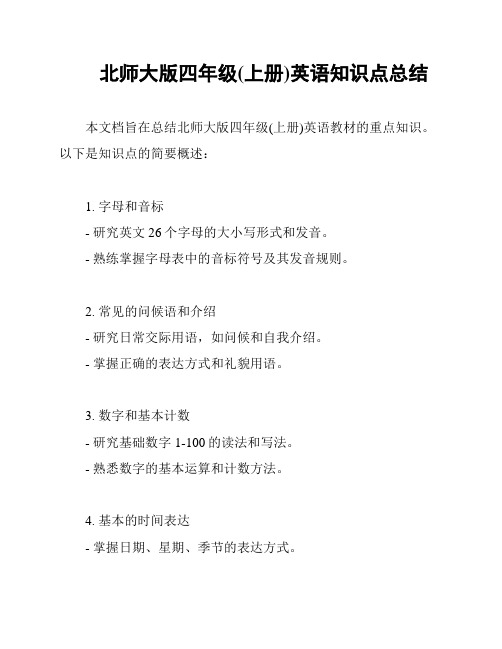
北师大版四年级(上册)英语知识点总结
本文档旨在总结北师大版四年级(上册)英语教材的重点知识。
以下是知识点的简要概述:
1. 字母和音标
- 研究英文26个字母的大小写形式和发音。
- 熟练掌握字母表中的音标符号及其发音规则。
2. 常见的问候语和介绍
- 研究日常交际用语,如问候和自我介绍。
- 掌握正确的表达方式和礼貌用语。
3. 数字和基本计数
- 研究基础数字1-100的读法和写法。
- 熟悉数字的基本运算和计数方法。
4. 基本的时间表达
- 掌握日期、星期、季节的表达方式。
- 研究日常时间的表达方式,如询问时间、描述一天的时间安排等。
5. 学校和教室用品
- 掌握学校和教室中常见物品的英文名称。
- 研究如何询问和描述这些物品。
6. 家庭成员和人物形容词
- 研究家庭成员的称呼,如父亲、母亲、兄弟姐妹等。
- 掌握描述人物外貌和性格的形容词。
7. 基本的食物和饮料
- 研究常见的食物和饮料的英文表达。
- 掌握如何提供和询问食物和饮料的服务。
8. 基本的地点和方位
- 研究常见地点和方位的英文表达,如家、学校、公园、上、下、左、右等。
- 熟悉如何问路和给出指示。
9. 基本的日常活动
- 研究描述日常活动的动词短语,如吃早饭、上学、看电视等。
- 熟练掌握这些动词短语的用法和时态。
以上是北师大版四年级(上册)英语教材的知识点总结。
希望本
文档对您有所帮助!。
北京课改版四年级英语上册全册知识点汇总
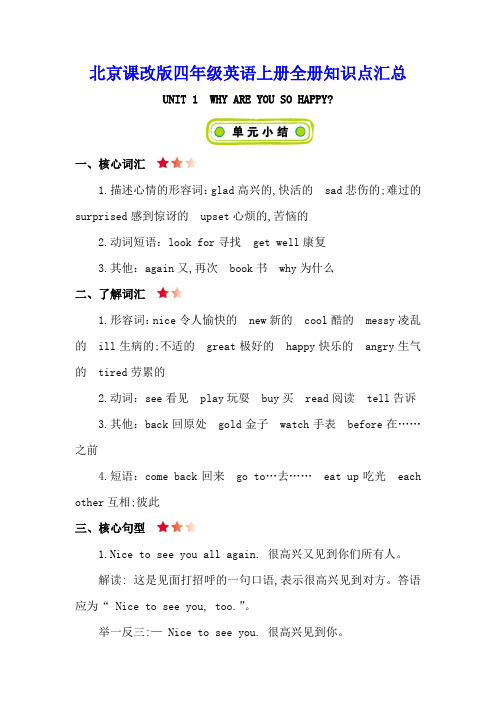
北京课改版四年级英语上册全册知识点汇总UNIT 1 WHY ARE YOU SO HAPPY?一、核心词汇1.描述心情的形容词:glad高兴的,快活的sad悲伤的;难过的surprised感到惊讶的upset心烦的,苦恼的2.动词短语:look for寻找get well康复3.其他:again又,再次book书why为什么二、了解词汇1.形容词:nice令人愉快的new新的cool酷的messy凌乱的ill生病的;不适的great极好的happy快乐的angry生气的tired劳累的2.动词:see看见play玩耍buy买read阅读tell告诉3.其他:back回原处gold金子watch手表before在……之前4.短语:come back回来go to…去……eat up吃光each other互相;彼此三、核心句型1.Nice to see you all again. 很高兴又见到你们所有人。
解读: 这是见面打招呼的一句口语,表示很高兴见到对方。
答语应为“ Nice to see you, too.”。
举一反三:— Nice to see you. 很高兴见到你。
— Nice to see you, too.很高兴见到你。
2.— Why are you so happy?你为什么这么高兴?— Because we are back at school. I like school. 因为我们回到学校了。
我喜欢学校。
解读: 这是询问原因及回答的句型。
句型结构: Why + be动词 + 主语 + 形容词?回答: Because + 原因.举一反三:— Why are you so tired?你为什么这么累?— Because I worked for 12 hours.因为我工作了12个小时。
— Why are you so sad?你为什么这么难过?— Because my dog is missing.因为我的狗丢了。
北京版小学英语教材四年级上册知识点总结

北京版小学英语教材四年级上册知识点总结(必做:所有内容一个单词中英文两遍,写在大英语本上;)(选做:四会单词默写,看中文写英文;三会单词及重点短语的英译中)四会单词:L1: again why books coolL2:sad great goldL3:new watch like together shapeL5:MsMrs speakL6: there story bring schoolL7:can bad tomorrow bed drink waterL9: much easyL10: door kind window cold turn openL11: ping-pong bat borrow take fine marker ruler pencil caseL15: get pen kind black brown think shapeL16: shoes try thirtyL17: buy trousers yellowL19: eat healthy potato now cook sweetL20: soup appleL21: twenty chicken change thirty today sixty-nineL23: snow hot rain clever water bad hard weatherL24: interesting close farmer lakeL25: live say kite wind三会单词:L1:glad because them happy angry tiredL2: missing surprisedL3: upset worried ill worryL5: robotL6: tell her really welcomeL9: please on play showL10:mindL11:favour scissors crayon sharpenerL15: help different colourL16: comfortable certainly takeL17: sell green redL19: sour saltyL20:salad fish hamburger chips dessertL21: moneyL23: because become degreeL24: sounds weekends liveL25: air trees without things plants grow重点短语:L1:be back at school the room is messy he played too hardL2: don’t be sad come back go to the zooL3: don’t be upset blue in colour English book new footballL5: speak to doing housework hold on have a lookL6: call back the Monkey King the Harry Potter stories(首大名称)L7:bad cold go to schoolL9: hold these books no problem on the computer close the window turn off the light pass me the waterL10: a glass of hot water opening the door turning off the radio turning on the light-pong bat with me. of courseL11: Will you do me a favour? I don’t have my pingL15: a nice colourL16: look at try on how much that pair of shoes that pair of slippers these sandals these boots those sneakersL17: a new jacket red one blue T-shirt black overcoat yellow cap school uniformL19: the sweet and sour fish take your order Chinese cabbage and potatoes some vegetables some meatballs Peking Duck a glass of soy milka pizza a glass of juice aL20: mushroom soup have ice cream(have some…/ an…)sandwichL21: orange juiceL23: in summer in winter below zero in Sydney(首大名称)it’s raining it’s snowing the sun is shiningL24: go to park close to nature love nature visit my uncle this winter vacation on a farm in the forest on the grassland by the lakeL25: find out on the Internet (首大名称)。
- 1、下载文档前请自行甄别文档内容的完整性,平台不提供额外的编辑、内容补充、找答案等附加服务。
- 2、"仅部分预览"的文档,不可在线预览部分如存在完整性等问题,可反馈申请退款(可完整预览的文档不适用该条件!)。
- 3、如文档侵犯您的权益,请联系客服反馈,我们会尽快为您处理(人工客服工作时间:9:00-18:30)。
UNIT1WHY ARE YOU SO HAPPY?一、核心词汇1.描述心情的形容词:glad高兴的,快活的sad悲伤的;难过的surprised感到惊讶的upset心烦的,苦恼的2.动词短语:look for寻找get well康复3.其他:again又,再次book书why为什么二、了解词汇1.形容词:nice令人愉快的new新的cool酷的messy凌乱的ill生病的;不适的great极好的happy快乐的angry生气的tired劳累的2.动词:see看见play玩耍buy买read阅读tell告诉3.其他:back回原处gold金子watch手表before在……之前4.短语:come back回来go to…去……eat up吃光each other互相;彼此三、核心句型1.Nice to see you all again.很高兴又见到你们所有人。
解读:这是见面打招呼的一句口语,表示很高兴见到对方。
答语应为“Nice to see you,too.”。
举一反三:—Nice to see you.很高兴见到你。
—Nice to see you,too.很高兴见到你。
2.—Why are you so happy?你为什么这么高兴?—Because we are back at school.I like school.因为我们回到学校了。
我喜欢学校。
解读:这是询问原因及回答的句型。
句型结构:Why+be动词+主语+形容词?回答:Because+原因.举一反三:—Why are you so tired?你为什么这么累?—Because I worked for12hours.因为我工作了12个小时。
—Why are you so sad?你为什么这么难过?—Because my dog is missing.因为我的狗丢了。
3.So do I.我也是。
解读:这是so引导的倒装句,表示前句叙述的情况也同样适合后句的人或物,意为“……也是”。
句型结构:So+be动词/助动词/情态动词+主语.举一反三:—I like English.我喜欢英语。
—So do I.我也喜欢。
—I eat an apple for dinner.我晚餐吃一个苹果。
—So does Jack.杰克也是。
4.He will come back soon.它很快就会回来的。
解读:这是一般将来时的肯定句,表示将要去做某事。
will后的动词要用原形。
句型结构:主语+will+动词原形+其他.举一反三:We will go to the park tomorrow.明天我们要去公园。
The panda will be back to China next week.那只熊猫将在下星期回到中国。
5.Don’t be upset.别苦恼。
解读:这是一个否定祈使句,用来表达劝告、叮嘱、请求或命令。
句型结构:Don’t+动词原形+其他.举一反三:Don’t be late.别迟到。
Don’t go out.别出去。
6.—What’s it like?它什么样儿?—It’s square in shape and blue in colour.它是方形的,蓝色的。
解读:这是what引导的特殊疑问句,用来询问人或事物的外表特征。
句型结构:What+be动词+主语+like?回答:主语+be动词+其他.举一反三:—What’s your brother like?你哥哥什么样儿?—He is tall and strong.他又高又壮。
四、了解句型1.I like school.我喜欢学校。
解读:like是动词,主语是第三人称单数时,like也要变为第三人称单数形式likes。
举一反三:Sara likes the new watch.萨拉喜欢这块新手表。
2.They are cool.它们很酷。
The room is messy.房间很乱。
解读:这是描述人或事物特征的句型。
be动词要随主语的变化而变化。
句型结构:主语+be动词+形容词.举一反三:The books are new.这些书是新的。
We are13.我们十三岁了。
3.I hope so.希望如此。
举一反三:I think so.我认为如此。
I don’t think so.我认为不是这样。
I guess so.我猜如此。
4.Zoey’s father buys her a pet dog.佐伊的爸爸给她买了一只宠物狗。
解读:这是表达给某人买某物的句型。
buy sb sth相当于buy sth for sb。
举一反三:I buy my son a watch.我给我儿子买了一块手表。
He buys his mother a flower.他给他妈妈买了一枝花。
5.Let’s look for it together.让我们一起找找吧。
解读:这是let引导的祈使句,用于向对方提出邀请或建议。
let后接不带to的动词不定式,构成短语let sb do sth,意思是“让某人做某事”。
句型结构:Let’s+动词原形+其他.举一反三:Let’s go home together.让我们一起回家吧。
Let’s be friends.让我们做朋友吧。
6.Maomao looks sad.毛毛看起来很难过。
解读:look在此作系动词,意为“看上去;看起来”。
举一反三:He looks happy.他看起来很高兴。
【拓展】常见的系动词还有:smell闻起来feel摸起来taste尝起来sound听起来UNIT2MAY I SPEAK TO MIKE?一、核心词汇1.动词:speak说话bring带来drink喝2.名词:robot机器人housework家务劳动school学校cold感冒3.其他:Ms女士Mrs夫人;太太really真的,是吗(表示疑问、惊讶、恼怒等) there在那里bad严重的,厉害的二、了解词汇1.名词:party聚会;宴会home家number数字phone电话water水football足球2.动词:call打电话stay停留;保持show展示3.其他:some一些them(宾格)他/她/它们who谁can能;会tomorrow明天with与(某人)在一起三、核心句型1.—May I speak to Mike?This is Yangyang.可以让迈克接电话吗?我是洋洋。
—Speaking.请讲。
解读:这是打电话给某人,接电话的正是要找的人的日常用语。
“May Ispeak to…?”意为“可以让……接电话吗?”,“This is….”表示“我是……”。
举一反三:—May I speak to Lily?This is Liangliang.可以让莉莉接电话吗?我是亮亮。
—Speaking.请讲。
—May I speak to Shasha?This is Tony.可以让莎莎接电话吗?我是托尼。
—Speaking.请讲。
2.I’m doing housework with my mum.我正在和我妈妈一起做家务。
解读:这是现在进行时的肯定句,表达某人正在做某事。
句型结构:主语+be动词+现在分词+其他.举一反三:Huanhuan is drinking water.欢欢正在喝水。
They are playing basketball.他们正在打篮球。
Lele and Sam are eating meat.乐乐和萨姆正在吃肉。
3.—Is Guoguo there?This is Sara.果果在吗?我是萨拉。
—Sorry,Sara.She’s not home.对不起,萨拉。
她不在家。
解读:这是打电话时询问及回答某人是否在的常用语。
举一反三:—Is Tom there?汤姆在吗?—Sorry,he is not home.对不起,他不在家。
—Is Tina there?蒂娜在吗?—Sorry,she is not here.对不起,她不在这儿。
4.—Who’s calling,please?请问谁在打电话?—This is Lingling.我是玲玲。
解读:这是询问及回答是谁在打电话的日常用语。
举一反三:—Who’s calling,please?请问谁在打电话?—This is Maomao.我是毛毛。
5.—Will you bring them to school tomorrow?你明天会把它们带到学校吗?—Yes,I will.是的,我会的。
解读:这是will引导的一般将来时的一般疑问句及其回答。
will not=won’t。
句型结构:Will+主语+动词原形+其他?回答:Yes,主语+will./No,主语+will not/won’t.—Will you come to my birthday party?你会来我的生日聚会吗?—Yes,I will.是,我会的。
—Will you go to the zoo on Sunday?你星期日会去动物园吗?—No,I won’t.不,我不会去。
四、了解句型1.Do you want to have a look?你想看一看吗?解读:这是询问对方是否想去做某事的句型。
want to do sth“想要去做某事”。
举一反三:Do you want to run with me?你想和我一起跑步吗?2.—What’s your phone number?你的电话号码是多少?—It’s….是……解读:这是询问及回答电话号码的句型。
举一反三:—What’s your phone number?你的电话号码是多少?—It’s8*******./87690345.是87690345。
/87690345。
3.I can’t go to school tomorrow.明天我不能去上学了。
解读:can’t=can not,是情态动词can的否定形式,意为“不能;不会”,后面跟动词原形。
举一反三:I can’t sing in English.我不会用英文唱歌。
They can’t drink coffee.他们不能喝咖啡。
4.She tells Miss Wang that she cannot go to school tomorrow.她告诉王老师她明天不能去上学。
解读:句中tell是“告诉”的意思,后面跟了双宾语,即某人、某事两个宾语。
that 起连接作用,不必翻译。
举一反三:Mum tells me that she wants to buy me a toy.妈妈告诉我她要给我买个玩具。
UNIT3WILL YOU DO ME A FAVOUR?一、核心词汇1.形容词:easy容易的fine好的;健康的kind体贴的,善良的2.动词:borrow借入take拿到;取得3.名词:computer电脑door门window窗户glass玻璃杯word字,词二、了解词汇1.形容词:cold冷的2.名词:radio收音机light灯drink饮料glasses眼镜favour恩惠bat球拍3.动词:show展示;给……看close关上pass递,传递feel感觉,觉得have 携带三、核心句型1.—Will you do me a favour,please?能请你帮我个忙吗?—Sure.当然可以。
